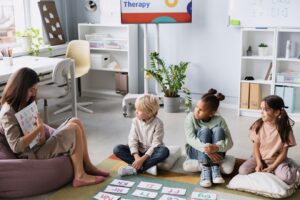Early brain development is a critical aspect of a child’s growth. During the first few years, a child’s brain undergoes rapid changes and forms connections that will last a lifetime. Baby class providers play a vital role in this developmental phase, offering techniques, brain training for kids and activities that stimulate cognitive growth.

Research shows that engaging children in interactive learning, language development, memory-building, sensory play, social interaction, physical activities, and creative activities can significantly enhance their brain development. These methods not only promote cognitive skills but also foster emotional and social well-being.
Interactive learning involves hands-on activities that make learning enjoyable and memorable. Moreover, language development through reading, singing, and talking enhances vocabulary and communication skills. Additionally, memory-building exercises help improve recall and cognitive function, while sensory play engages a child’s senses, thus aiding in overall development.
Furthermore, social interaction, physical activities, and creative endeavours also contribute to a child’s brain growth. Specifically, group activities and playdates teach social skills, physical games improve motor skills, and creative activities stimulate imagination and problem-solving abilities.
Consequently, this blog explores these effective brain training techniques provided by leading baby class providers. As a result, parents can implement these strategies at home, ensuring their children receive the best start in life. Ultimately, understanding and utilizing these methods will support a child’s journey toward successful lifelong learning.
Interactive Learning
Interactive learning is essential; indeed, kids learn best through hands-on activities. Consequently, baby class providers use toys and games to make learning fun.
Hands-On Activities
- Building blocks improve motor skills and problem-solving.
- Puzzles enhance critical thinking and patience.
- Art projects like painting boost creativity.
Use of Toys and Games
- Toys like shape sorters teach kids about shapes and sizes.
- Counting toys introduces basic math concepts.
- Musical toys develop auditory skills and rhythm.
Examples from Baby Classes
- In typical baby classes, kids might play with water tables. They learn about volume and textures.
- Sensory bins with rice, beans, or sand help kids explore different sensations.
- Storytime sessions engage kids in listening and comprehension.
Interactive learning keeps kids engaged. They enjoy activities and learn effectively.
Language Development
Language skills are fundamental. Reading, singing, and talking are simple ways to boost language development.
Reading to Kids
- Start with picture books. They attract kids’ attention.
- Use books with repetitive phrases. They help kids remember words.
- Ask questions about the story. It encourages interaction.
Singing Songs and Rhymes
- Nursery rhymes are great. They have repetitive patterns.
- Songs with actions, like “Itsy Bitsy Spider,” combine movement with words.
- Singing introduces new vocabulary in a fun way.
Encouraging Babbling and Talking
- Respond to your child’s sounds. It encourages them to keep trying.
- Describe your actions. It helps them connect words to activities.
- Use simple words and short sentences. It makes it easier for kids to understand.
Language development activities are enjoyable. They are also beneficial for kids.
Memory Building
Memory games are effective for brain training for kids. Repetition and routines help improve memory.
Simple Memory Games
- Play matching games with cards. They boost short-term memory.
- Hide and seek with toys helps kids remember locations.
- “Simon Says” improves listening and memory.
Repetition and Routines
- Repeat daily activities. It helps kids remember sequences.
- Establish a routine for meals, play, and sleep.
- Use consistent phrases for common activities, like “Time to eat.”
Tips from Experts
- Use visual aids, like charts or flashcards. They reinforce learning.
- Practice regularly but keep it fun.
- Encourage kids to recall events from their day.
Memory-building activities support cognitive development. They prepare kids for future learning.
Sensory Play
Sensory play engages kids’ senses. It enhances learning and development.
Activities That Engage the Senses
- Playdough activities engage touch and creativity.
- Listening to different sounds, like animals or instruments, sharpens auditory skills.
- Tasting different foods introduces new flavours and textures.
Benefits of Sensory Play
- It helps develop fine motor skills.
- It promotes language development by describing sensations.
- It improves social skills when done in groups.
Suggestions from Baby Class Providers
- Create a sensory bin with safe, household items.
- Use water play for tactile and visual experiences.
- Introduce and play for a different texture experience.
Sensory play is fun. It is also crucial for brain development.
Social Interaction
Social interaction is essential. It helps kids develop communication and emotional skills. Group activities and playdates are effective methods.
Group Activities and Playdates
- Organized playdates encourage kids to interact with peers.
- Group games, like “Duck, Duck, Goose,” teach kids to follow rules and take turns.
- Storytime sessions in groups foster listening and sharing skills.
Learning Through Social Play
- Kids learn empathy by observing others’ emotions.
- Role-playing games help kids understand different perspectives.
- Collaborative building projects promote teamwork and problem-solving.
Advice from Baby Classes
- Encourage kids to join group activities.
- Model positive social interactions.
- Praise kids when they play well with others.
Social interaction activities build strong communication skills. They prepare kids for school and beyond.
Physical Activities
Physical activities are indeed vital. Consequently, this movement supports brain development and overall health. Thus, baby class providers employ various physical games and exercises.
Importance of Movement for Brain Development
- Physical activity increases blood flow to the brain.
- It enhances motor skills and coordination.
- Active kids are more likely to stay engaged in learning.
Examples of Physical Games and Exercises
- Simple exercises, like jumping jacks, boost energy and focus.
- Obstacle courses improve balance and problem-solving skills.
- Dance sessions combine music and movement for a fun workout.
Insights from Baby Class Instructors
- Include a mix of structured and free play.
- Ensure activities are age-appropriate.
- Encourage kids to try new movements and activities.
Physical activities keep kids healthy. They also support cognitive development.
Creative Activities
Creative activities stimulate the brain. Arts and crafts are popular in baby classes.
Arts and Crafts for Brain Stimulation
- Drawing and painting develop fine motor skills and creativity.
- Collage-making introduces textures and patterns.
- Simple sculpture with clay or playdough enhances tactile learning.
Encouraging Creativity in Kids
- Provide various materials, like crayons, paper, and glue.
- Allow kids to explore their imagination without strict guidelines.
- Celebrate their creations, no matter how simple.
Recommendations from Baby Class Providers
- Rotate art supplies to keep activities fresh.
- Set up a dedicated art space for kids.
- Join kids in creative activities to inspire them.
Creative activities boost brain function. They foster a love for learning and self-expression.
Conclusion
Ultimately, social interaction, physical activities, and creative pursuits are vital for early brain development. Consequently, baby class providers use these techniques effectively. Moreover, parents can easily integrate these activities at home. Thus, they make learning enjoyable and effective.
Furthermore, by incorporating these methods, you can support your child’s brain development. Indeed, these activities are not only educational but also fun. Additionally, they help build a strong foundation for future learning.
Therefore, try these techniques. Subsequently, watch your child enjoy and benefit from them. Undoubtedly, early brain development sets the stage for lifelong learning.
Read More : theguestblogs.com






